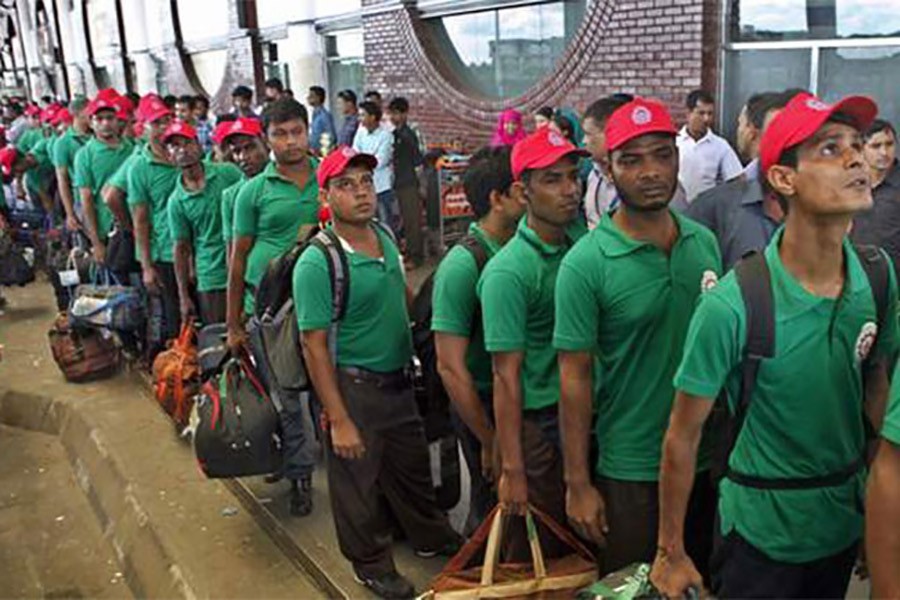
Published :
Updated :

Workers' migration that has never been free from scores of unresolved problems is now faced with the most difficult challenges. In the wake of the covid-19, prospects of jobs abroad and stay of the workers who are already engaged in overseas workplaces seem all but uncertain. As a result, workers' remittance, the second highest source of earning from abroad, next to garment export, is sure to face unprecedented slump in the days ahead.
Bangladesh sent 181,218 workers in the first three months of 2020, after which manpower export came to a halt, according to data of the Bureau of Manpower, Employment and Training. There is little scope to send manpower to the Gulf countries due to the ongoing financial meltdown where nearly 80 per cent of the 1.20 crore-odd Bangladeshi migrant workers are employed. Remittance hit an all-time high of $18.20 billion in the just-concluded fiscal year. Bangladesh received remittance worth $4.01 billion from Saudi Arabia in fiscal 2019-20, which is 22.05 per cent of what Bangladesh got from around the globe that year. Remittance from the United Arab Emirates and Kuwait stood at $2.47 billion and $1.37 billion respectively last fiscal year.
The country has expat workers in many countries of the Middle Eastern region, Europe and parts of Asia. In the ME alone, the number of workers is around a staggering 3.0 million-- 75 per cent of the total Bangladeshi expatriate workers. In the situation that most host countries are now going through, it will be very difficult for them to retain foreign workers in their jobs and hence the looming fear of mass exodus of returnees is more than just challenging for Bangladesh to deal with.
Deportation of workers has already started. According to Expatriates Welfare and Overseas Employment Minister more than 0.1 million Bangladeshis returned home since the coronavirus outbreak. In the past month, despite very few flights in operation, quite a number of workers returned home. According to a FE report, several thousand workers retuned in the past weeks from Kuwait, Oman, Bahrain and Saudi Arabia. All these host countries are going to deport more workers phase by phase. Kuwait has already sent a list of 4,428 workers whom they want to deport immediately. The number of deportees in the first phase will be around 15,000. In Bahrain, as a news report says, 7000 to 8000 Bangladeshi workers have lost their jobs. Latest development suggests that Kuwait is going for drastic actions to substantially reduce foreign workers which will seriously affect migrant workers, particularly from India and Bangladesh. While more than eight hundred thousand Indian workers may lose their lobs there, the number of Bangladeshis is likely to be well over one hundred thousand.
What is alarming for the returnee workers is the utter lack of assurance whether they, even after a long time lag, can get back to their workplaces abroad-- in post-corona times. While rehabilitating the economies would be the prime concern of the host countries, that too with cautious spending, jobseekers from Bangladesh might not find things easy at all. The picture is only a part-- a beginning of a potentially threatening scenario for the economy. Given that the vast majority of the workers are unskilled, engaged mostly in manual works in construction sites and development projects, chances are high that the host countries, particularly the Middle Eastern countries, might prefer to halt a good number of such projects. The drastic fall in oil prices has also signaled a note of alarm for these countries, and it is highly likely that they would cut expenses in paying wages to foreigners but for unavoidable services.
Against the backdrop, the country will have to explore new markets and undertake medium and long-term plans to export skilled people, experts said. "The government should give emphasis on East Asian countries as they are less affected compared to other host nations of the Bangladeshi expats," said Mustafizur Rahman, distinguished fellow of the Centre for Policy Dialogue. Malaysia, Singapore, South Korea and Japan will turn their economy around in a quick manner as they have successfully controlled the pandemic, he said. Last fiscal year, the four countries ranked 7th, 10th, 12th and 22nd positions respectively in terms of the remittance sent to Bangladesh, according to data from the central bank.
Given the state of things, it is crucially important to design strategies to face the situation to avert the worst. Observers feel that the prospect for unskilled workers may not hold good in the near future. And thus in order to cater for semi-skilled and skilled jobs, there is hardly any choice but to create demand-based skills and upgrade training in keeping with the market-specific needs.


 For all latest news, follow The Financial Express Google News channel.
For all latest news, follow The Financial Express Google News channel.